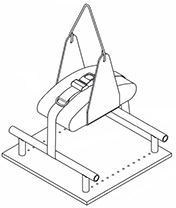Postural support devices, constructed as additional components to wheelchair seating, are widely available. The selection or prescription of the most appropriate postural support device should be partially dependent on its ability to withstand static and repeated loads. The new wheelchair seating standards specify test methods for measuring a device's ability to withstand these forces. Tests involve mounting the device on a rigid test fixture to simulate a wheelchair, and applying forces to simulate normal usage.

The maximum allowable slip for both tests is 10mm. Typical slip for a Bodypoint belt is just 0-5mm. To a wheelchair user, a few millimeters can mean the difference between a safe, comfortably fitted belt, and one that rubs, aggravates, goes unused, or requires constant re-positioning.
Bodypoint is the only known soft postural support line that tests each of its models to all applicable standards. Untested products not only put your customers' comfort and safety at risk; they can negatively affect your profitability. Although the initial cost of other products may be lower, broken grommets, belt slippage, overstretched material or other failures can force service calls that translate into higher overall costs. Consider the following example: